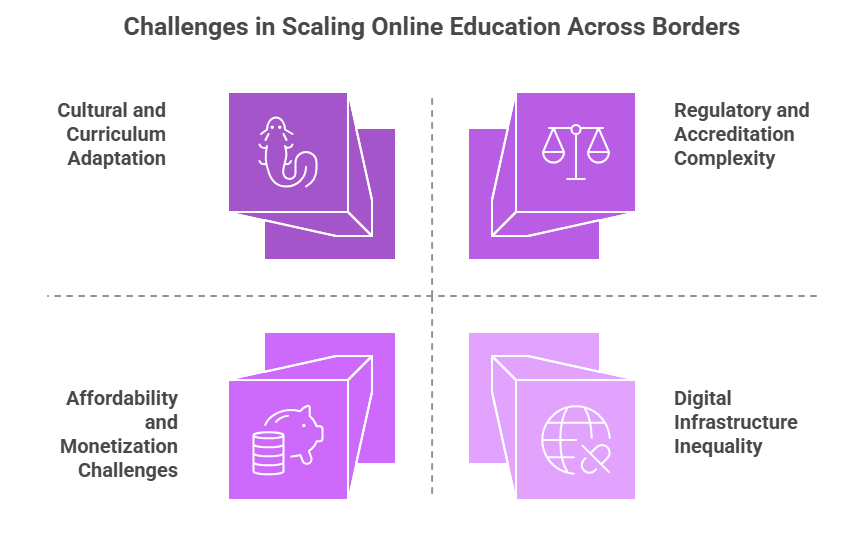Online education has become a global default. What began as an emergency shift has evolved into a permanent move toward online, hybrid, microlearning, and lifelong learning models.
Students and working professionals now prioritize flexibility, affordability, and personalization over traditional classrooms. More than 60% of global learners prefer self-paced or hybrid formats, fueling rapid adoption of EdTech platforms, AI-based learning tools, and virtual degree programs. Yet as the sector grows, challenges around international scalability have intensified.
This is why a structured market entry strategy is essential for achieving sustainable global EdTech growth.
Key Challenges in Scaling Online Education Across Borders
Global opportunity comes with unique regulatory, cultural, and infrastructural hurdles. EdTech firms must navigate these barriers strategically to achieve sustainable international growth.

- Regulatory and Accreditation Complexity: Regulatory misalignment can delay entry by 6–18 months, increasing operational and compliance costs.
- Cultural and Curriculum Adaptation: Learning needs vary widely across markets, and cultural alignment is often the deciding factor in EdTech success. Platforms that ignore these nuances regularly see engagement drop by 30–40%.
- Digital Infrastructure Inequality: The World Bank (2024) reports that 35% of students in developing regions still lack reliable internet access or affordable devices.
- Affordability and Monetization Challenges: Household spending on education varies significantly, and in many markets, less than 20% of learners can afford premium-priced programs without installment options or local financing partners.
Nexdigm’s Market Entry Strategy Framework for Online Education Providers
Global EdTech expansion requires structured planning, cultural sensitivity, and continuous adaptation. Nexdigm’s Market Entry Strategy Framework integrates all three through four core pillars.
Regulatory and Accreditation Mapping
Each education market operates within its own regulatory blueprint. Nexdigm analyzes:
- National online education acts
- E-learning accreditation norms
- Cross-border content licensing
- Quality assurance and program validation rules
- Data localization requirements
This foundational clarity reduces compliance risks and accelerates approval timelines.
Market Readiness and Feasibility Assessment
Market potential is meaningful only when paired with readiness. Nexdigm evaluates:
- Student digital adoption levels
- Broadband and device penetration
- Affordability segments
- Employer and institutional demand
- Competition benchmarks
This ensures EdTech providers understand not just size, but viability of the opportunity.
Localization and Partnership Strategy
Localization determines acceptance. Nexdigm assists with:
- Curriculum adaptation and language integration
- Pricing and monetization alignment
- Platform UX modification for local bandwidth
- Identifying universities, EdTech distributors, and corporate partners
Localized EdTech programs achieve 30–50% higher student engagement and significantly stronger completion rates.
Execution and Growth Enablement
Nexdigm turns research into actionable execution through:
- Pilot program design
- Student acquisition strategy
- Marketing and outreach support
- Instructor and partner onboarding
- Post-launch analytics and optimization
This ensures continuous adaptation to shifting regulations, student needs, and competitive pressures.
Nexdigm Case
Nexdigm helped an online learning provider expand into Southeast Asia by mapping regulations, localizing content, and designing a targeted go-to-market plan, resulting in a 30% faster launch and significantly stronger early enrollment across priority markets.
To take the next step, simply visit our Request a Consultation page and share your requirements with us.
Harsh Mittal
+91-8422857704

